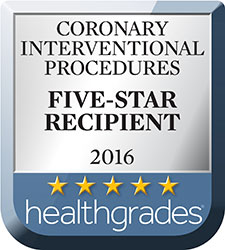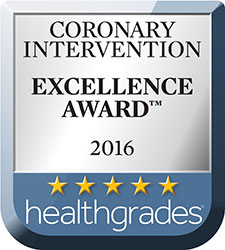Healthgrades has recognized EIRMC as Top 10% in the Nation for Coronary Intervention Excellence, and awarded us a five-star rating for 2016.
Eastern Idaho Regional Medical Center is the only hospital in the region offering minimally-invasive heart valve repair and replacement.

In traditional heart surgery, an incision is cut down the patient’s chest, the length of the breastbone. This approach provides excellent access to the heart, but results in a six to eight-inch incision. The recovery period is typically 6 to 8 weeks, and includes significant restrictions to working, lifting, and driving.
In contrast, minimally-invasive surgery is performed through one or two small incisions aside the rib cage, measuring about three to four inches. Patients can be back to work as soon as a week without lifting or driving restrictions.

Benefits of Minimally Invasive Surgery
- Small incision and small scar
- Shorter hospital stay after surgery
- Low risk of infection
- Low risk of bleeding and blood transfusion
- Shorter recovery time and faster return to normal activities/work
Aortic valve surgery to replace the aortic valve is common for patients suffering from aortic stenosis. Aortic stenosis (or AS) is a narrowing of the aortic valve in the heart due that causes restricted blood flow through the valve. As a result, the heart contracts harder to pump blood into the aorta. AS can lead to heart failure and lung congestion.
Watch Dr. Scott Needham’s video as he discusses minimally-invasive valve repair and replacement.